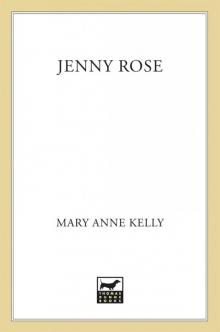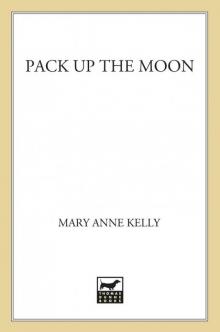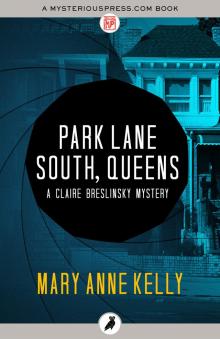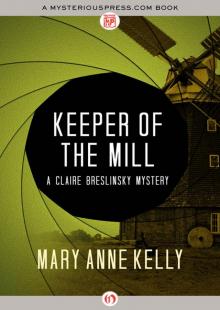- Home
- Mary Anne Kelly
Pack Up the Moon Page 4
Pack Up the Moon Read online
Page 4
Chartreuse didn’t have to be asked twice. He rubbed his unshaven chin, leaned over, and made the slightest thumb smudge on the edge of the horse’s mane, pushing in the direction behind the horse, giving it the immediate impression of speed.
“Brilliant!” I sat back and beamed up at him. “You’re too much. Now, see, why didn’t I think of that?”
“Eet is not in the thought but in ze immediate response, chérie. And …” He paused and I had the feeling he was trying to say something important, “You must try to capture, to convey, what is not seen. What I mean is, the atmosphere is as urgent to communicate as the view. Eh? Do I say it right?”
“Oh, yes, Chartreuse. You say it very well. Tell me. Why did you ever give up painting?”
“Me? I never gave anything up in my entire life. There are so many wonderful ways to spend one’s time.” He shook his head. “You Americans! You think life is lived from one category to the next!”
“It’s because we watch television stories between the commercials and we think that’s us.”
He swung his guitar around onto his lap and strummed it softly. “Anyway,” he added in his thick French accent, “I can’t afford the paint.”
“Yeah, sure. Maybe if you stopped dealing for a couple of weeks, you’d have a little energy and space.”
“Just a leetle hashish.” He shrugged. “Eet hurts no one.”
“No one but you, you dope.”
He looked at me with his lion yellow eyes. The picture of innocence. “You are not paying attention to me,” he admonished.
Across the room, Isolde’s husband, Vladimir, got up, lit a cigarette, and walked across the restaurant with a young pretty girl. He was a big man, with hands the size of hamhocks. A sculptor. Aristocracy from Denmark and Japan had had their heads done by him. And politicians. So you knew he was well thought of. Isolde wouldn’t let any of his larger pieces out of the flat. She claimed to be so attached to them, although I suspected it was the money they represented. And Harry Honeycutt, the fellow I’d met on the mountain that day, thought so, too. He was always warning her not to let them go. Harry knew about those things, Isolde confided. He was a well-respected arts and theater critic in London, although I found it hard to believe (he was always such a mess around Isolde).
I knew Vladimir and Isolde were still scheduled for a divorce, although the plans to part seemed to be going on longer than the marriage itself. I also knew that Isolde, despite her bravado, was still in love with him. I waved. Seeing Chartreuse, he raised one disapproving brow and kept walking.
I couldn’t help liking Chartreuse, although I knew well enough he was usually up to no good. One day I’d caught a glimpse into his guitar case. Sterling silver forks and spoons glittered dully from the pocket. I’d not dared wonder where they’d come from. I’d looked away. The truth was, I liked him despite my better judgment. He made me laugh with his irreverent jousts at authority and the establishment. He entertained me with his songs. And he spoke English. It didn’t occur to me until much later that the thing I liked most about Chartreuse was his admiration for my drawing.
“I don’t suppose you could lend me some money?” he said now.
“I’ve already lent you some! Pay me back and you can ask again. Not before.”
“I could sell you my van as collateral. It’s in superb condition.”
“That van again! You don’t sell as collateral. You give.”
“Oh,” he said, not at all offended.
We sat there, me sketching the colorful, unusual faces, he strumming his beat-up acoustic guitar. “This is the life,” I said.
“You are quite sure you are not interested in a leetle rendezvous? At my place? This evening?”
I laughed happily. “I’ve got to give it to you, Chartreuse. You never give up.”
I went ahead trying to capture the leisurely gonging kirk bell, the too blue blue sky, and the nearby bright drone of a well-poised and resolute bee.
chapter four
I walked home with a feeling that life was good. The au pair’s apartment, a cozy little knotty-pine appendage, was so comfortable and suited my needs so well that I knew I would remember it with regret wherever else I would live for the rest of my life.
It had a bookcase and a waterbed and a hot plate on a white marble slab that had been placed on a wrought iron sewing machine stand. A dramatically eaved bathroom was papered old-fashioned beige with tiny pink blossoms. There was an easy chair and a comfortable claw-foot tub with an oval window overlooking balconies and lines of clean clothes. At all hours the delectable aroma of bread wafted from the bakery below. It was from this idyllic covey that the children’s au pair had been coldheartedly ejected overnight and made to go live with the children, but at the time I’d imagined one didn’t have to pay at all for inconveniencing others.
I yanked open the heavy front door from the street. On the first landing, I would inevitably pass Frau Zwekl. I liked Frau Zwekl. She was stunningly old, a mixture of forthright elbows, squinting eyes, and sagging belly. Her long thin hair was woven, then coiled, into a braided coronet and she wore daily the same ornate, queenly Bohemian garnets in her fleshy, quick-listening ears. Her face was as lined as crinkled yellowed paper but still she labored away, still taking laundry. She’d lived in the first-landing apartment all her life. Nothing failed to shock her. And she liked to be shocked. Her face—she had a handsome set of false teeth—would light up when she saw me coming. I suppose I was the highlight of her day. I’m sure few others found time to chat. Her big, arthritic hands would speed up over the work before her, snapping pillowcases and smoothing them into neat squares while her eyes would glisten like a monkey’s, hungry for scraps of information.
Isolde, my notorious landlady, was her favorite topic. Frau Zwekl’s English was even worse than my limping German and so I had no qualms about stopping and making a fool of myself while we chatted. When I’d first come to this house I’d dawdled away many an evening with her. I would bring her those little glass pots of jelly they give you in hotels and pensions. She loved them. Especially blackberry. It had all been fine at first. I learned to brave my first German sentence with Frau Zwekl. Yes, it was she who started me learning German because I hadn’t really cared what she thought of me. She’d complained once how the ‘Hund’ on the second floor had kept her up all night.
Uncomprehending, I’d looked at her blankly. “Hund?”
“Hund,” Frau Zwekl had said, turning into her apartment and picking up the small bronze Pekingese that sat with other tchotchkes on the pie-crust table. She displayed it in her wrinkled palm.
“Ah. Dog. The dog kept you up all night.”
“Ja!” she’d congratulated me with a joyous smile. Her English vocabulary was about a hundred words, and so I would dig out my little German phrase book and the two of us would trade information. With a mixture of sign language and exaggerated rolling of the eyes in the appropriate places, it was amazing how much local gossip she and I managed to convey to each other. I used to save malicious little shockers for her and pass them over, like gems to a jeweler. One of these was Isolde’s upcoming divorce, which she received with delight, making me go over it again and again to make sure she’d understood.
The last time I’d seen Frau Zwekl, I’d scurried past, tapping my watch and turning my face to a grimace, so she’d understand I was stuck for time. I hadn’t been, but the initial glow of our relationship had worn off, and I had other things to think of now. The truth was, I didn’t need her anymore and—with all the heartless hurry of youth—I’d passed her by.
“Warte nur einen Moment,” she’d called out to me. Wait for just one moment!
I’d stopped on the landing and she’d clattered up after me, pressing a handkerchief into my hand. “Ich habe es selbst bestickt!” She’d smiled proudly. She’d embroidered it herself. It was some sort of bird.
“What is it?” I’d shifted my heavy bag from one shoulder to the other. It looked like one of those
Johnny Ott hex signs they paint on the barns in Amish country.
She’d closed my hand over the fine, worn cotton. “Distelfink,” she’d murmured, her enigmatic eyes piercing mine. “Für Glück.”
I’d kissed her swiftly on the cheek and run the rest of the way up the stairs. For happiness. For luck. Understanding more than I gave her credit for, she’d smiled and waved me on.
She’d catch me on a better day, she’d called out in German, and I’d laughed gaily, because I’d understood her.
She wasn’t in her sentry spot today, though, and I felt both disappointment and relief.
A small boy with large gray eyes and a cat on his lap sat watching me mount the stairs. This was Rupert, Isolde’s younger boy. Well into his fourth year on the planet, Rupert was hardly known to speak at all. Not in any language. I attributed this to the fact that no one language occupied the entire space of any conversation in the flat.
“That’s rubbish,” Isolde would say. “Look at Dirk.” Dirk was her other son, already five, who, thanks to a colorful and varied exposure to boarders like photo models and sporadic nannies, carried on in German, Italian, Slovenian, and, lately, English. The rule was that only English was spoken at table. Isolde thought it would do them good. That Rupert never spoke a word of anything didn’t seem to faze her. He pounded the piano with a dramatic, almost Mediterranean flourish and this, she considered, was language enough.
“Hello, Rupert.” I dropped my sack now and gave the cat a tickle.
Rupert watched me steadily with wide, unblinking eyes while I fumbled for the keys. The sound of music filtered into the stairwell. “Who’s that now, Rupert? Mozart or Telemann? You know I always mix them up.”
Rupert rose, casually hanging the unresisting cat by the fur of her neck, and pushed the massive door right open. He paused once for imperious effect, then locomoted through.
I flumped my sack once more onto my back and followed.
Inside, black-and-white-tiled floors gleamed under tall chalk ceilings. Couch-sized sculptures of women in bronze reclined every which way here and there. There were unframed, enormous silk paintings from Bali on the walls and zebra and fur throws all about the comfortable velvet couches. Rupert disappeared into the children’s wing.
“Hallo,” came a pleasant British accent through the archway. “Is that you, Rupert?”
“No, it’s me,” I called, dropping my sack and going in. “Rupert’s in the nursery.”
Daisy Dahlhaus, Isolde’s English au pair whom I’d displaced, was sitting at the dining room table behind a huge pile of white asparagus.
“Well!” She sniffed. “And where have you been?”
Daisy had round, astonished blue eyes and ermine ringlets springing out all over in an unruly, Louis XIV disarray. At night, she’d take exorbitant amounts of time to manicure her well-trimmed nails and paint them up a ladylike mauve. She’d wave them at everyone on their individual way out, our sensible Daisy, while she sat before the telly learning German verb tenses in baby’s-breath terry cloth, a strand of pearls, and Christmas-present talcum.
“I stopped off at the Riding School café.”
“Did you now! Dressed like that? The poshest café in Munich with all the jet-setters driving their Porsches up onto the pavement … and you went looking like that?” Daisy regarded me with distaste.
Right. My messes of dark red hair were yanked convulsively into a knot and I could taste a smear of charcoal across my mouth. My hat was stuffed into my sack, my jeans rumpled from their long day in a heap under the makeup table. Daisy threw her beefy little arms up in exasperation. “Oblivious to all those lovely men?” she scolded. “Sitting there being Toulouse-Lautrec again, I’ll wager, sketching the lot!”
“The jet-setters aren’t there on weekdays, Daisy. It’s just students and chess addicts and gigolos.”
“Gigolos? Right. Just waiting about for the likes of you!”
“I wasn’t picked up, don’t worry. I was quite safe sitting with Chatreuse.”
“Chartreuse!” Daisy squawked, outraged. “That pissy Frenchman? How could you? Everyone will think you’re his mistress!”
“Oh, they won’t. We’re good friends.”
“They bloody will! Everyone will think you’re on drugs!”
“Well, I am, if smoking a little pot is being on drugs. Everyone smokes pot.”
“I don’t!”
“I know you don’t.”
“Claire! That hashish he peddles isn’t pot! It’s disgusting!”
“It is very strong,” I agreed. “It’s the seventies, Daisy. No one cares who sleeps with whom.”
“I don’t know what’s the matter with you.” Daisy picked up her peeler again as though her heart was no longer in it, and resumed whittling Isolde’s asparagus. They’re not like American asparagus, the white ones. You’ve really got to peel them, the way you would carrots. The end result, however, is heavenly and worth every effort. “You think you’re going to catch a man when you go gadding about disguised as a soccer player, do you?” she went on badgering me. “It’s no wonder no one rings you up. All the likely fellows have given up.”
“Likely playboys and gigolos, you mean. No point in going out with them.”
“Right. Better to hang about with a drug dealer.”
“He’s a musician,” I said, remembering Chartreuse’s guitar. “And he makes me laugh.”
“Oh, he’s not witty,” she said with sudden insight. “You just like that he flatters you.”
It’s true, I realized.
“Sorry I’m so cross.” She sighed. “It’s a very good thing you came home. I just devoured the Havarti cheese and apricot jam on sunflower bread and was about to go back for more. God, I’ll never get that bloody ironing finished. I polished the floor in there. I don’t suppose you bothered to notice.” Daisy’s chubby jaw shut with a martyred click.
I didn’t feel too sorry for Daisy. She was in fact a diplomat’s daughter, born in Singapore, schooled in Dehli and Geneva, and would one day return to that life.
“I noticed everything looks exceptionally spic and span,” I said admiringly, taking it all in. “What’s up?”
“Oh, she’s having a bunch of swells over tonight. Some big director from Berlin. He’s looking the flat over to see if he’ll want to use it for his film.” Isolde was constantly renting out the flat to film people to make extra money.
“Oh, no,” I cried. “Not again! She just got rid of that TV commercial crew.”
“Film people are quite different from advertising people. Anyway, someone has to pay for all the fancy goings-on,” she said, imitating Isolde’s parsimonious voice.
“But all those cables!”
“I know. Everything underfoot. You can never shut a door properly. Still, I’m rather pleased. There’s such an undercover of excitement with that lot! They take their work so seriously. You almost begin to believe in the malarky yourself! Do those gladiola look as though they’ve had it?”
“No. What’s she cooking?”
“Lamb, I think. She’s got me thawing the mint jellies from the freezer.”
I was drawn to the kitchen. “Mint jellies?” I picked one up from the dish. “Looks intriguing. What is it?”
“She cuts up a bunch of fresh mint, really fine, like a paste. Then she puts them in ice cube trays with aspic. You know. That gel that forms from bone marrow.”
I dropped it quickly. “Oh.”
“That Tupelo Honig is coming. The film star. Isolde’s fixed her up with her plastic surgeon.”
“Oh?”
“Yes. I think it’s sort of a trade-off. She’ll bring the surgeon all her friends in the film business and he’ll save her from growing old. Isolde tells her she’ll get better parts if she’s not desperate for them. You must admit Isolde is dead on the money nine times out of ten.”
I was silent, stopping a big lemon that had rolled to the edge of the table. Its blissful smell filled the room.
“Rea
lly,” Daisy continued, “Isolde’s shameless! Imagine introducing your doctor to famous women in exchange for eye lifts. Yuck.”
“He’s the one who sounds disgusting,” I called, returning from the kitchen. “And who’s this Tupelo Honig the film star? I’ve never heard of her.”
“Well, I mean, I’ve never heard of her, either, but the way Isolde makes astonished, disbelieving eyes at you when you say you never have, you’d think you were living on Mars if you haven’t. She makes all those films with five minutes of close-up and very little dialogue. You know.” She slammed the iron down hard. “Not that I ever get the chance to go to the cinema. All I ever get to go see is Pippi Langstrumpf and Paddington Bear and the like. Mind you, I’ll be relieved to have some adults about.”
“I don’t blame you. So who else is coming?”
“She’s gone and spent a bomb on these white asparagus,” Daisy continued to rant. “She yells like mad at me for not shopping at the Plus, just to save a few extra crummy Pfennig, and then she goes and buys everything madly expensive at the Viktualienmarkt.”
“Daisy! Who’s coming?”
“Oh. Well, let’s see. The hubby, Vladimir. He’ll come. I know he wants to pick up some more of his records. Hell. The best ones are his, you know. How much you want to bet she’ll get him drunk so he’ll forget the records? And of course the one they call Blacky. The Graf. Count. Vladimir and he are both counts, you know. I suppose that’s why they get on.” She stopped for a moment and wiggled her head in a satisfied way. She and I both savored living with the bluebloods. “You’ve met him. Haven’t you? No, I suppose not. You were on that bathing suit trip to the Canary Islands last time he was here, weren’t you.”
“I guess so.”
“Now, he is sexy. Although,” she scowled, “I don’t much like him.”
I looked up, interested. “Why not?”
“I suppose I’m a bit frightened of him. Don’t even think of setting your cap for him, missy. Isolde’s got him fixed up with that film star.”
“What?”
“The one Isolde introduced him to.”

 Foxglove
Foxglove Jenny Rose
Jenny Rose Pack Up the Moon
Pack Up the Moon Park Lane South, Queens
Park Lane South, Queens Keeper of the Mill
Keeper of the Mill Twillyweed
Twillyweed